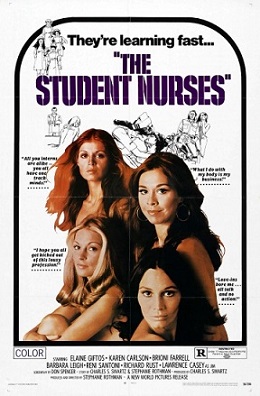The Student Nurses
The Student Nurses is a 1970 American exploitation film directed by Stephanie Rothman. It is considered one of the earliest entries in the nurse exploitation film genre, which gained popularity in the early 1970s. The film follows the lives of four young nursing students navigating their personal and professional lives while working at a busy Los Angeles hospital. The narrative delves into various social issues of the time, including the women's liberation movement, abortion, drug abuse, and the ethical dilemmas faced by medical professionals.
Plot[edit | edit source]
The film centers around four nursing students: Phred, Lynn, Sharon, and Laurie. Each character represents a different aspect of the societal issues of the era. Phred is involved in the women's liberation movement and faces the challenge of balancing her activism with her duties as a nurse. Lynn deals with the emotional and ethical complexities of abortion. Sharon becomes romantically involved with a drug-addicted patient, highlighting the issue of drug abuse. Laurie explores the boundaries of the nurse-patient relationship through her involvement with a terminally ill patient. As they progress through their training, the students confront and overcome various personal and professional challenges, ultimately growing both as individuals and as nurses.
Cast[edit | edit source]
- Elaine Giftos as Phred
- Karen Carlson as Lynn
- Brioni Farrell as Sharon
- Barbara Leigh as Laurie
- Lawrence P. Casey as Dr. Jim McKinley
- Dick Miller as a patient
Production[edit | edit source]
Directed by Stephanie Rothman, The Student Nurses was produced by Roger Corman's New World Pictures, a company known for its low-budget, independent films that often explored controversial or topical subjects. Rothman, one of the few female directors working in exploitation cinema at the time, brought a unique perspective to the film, blending exploitation elements with social commentary.
Reception[edit | edit source]
Upon its release, The Student Nurses received mixed reviews. Critics praised the film for its attempt to tackle serious issues within the constraints of the exploitation genre, but some criticized it for its melodramatic elements and exploitation of its female characters. Despite this, the film was a commercial success, leading to a series of similar nurse-themed exploitation films throughout the 1970s.
Legacy[edit | edit source]
The Student Nurses is credited with launching the nurse exploitation genre, which includes films such as Candy Stripe Nurses and Night Call Nurses. These films, while often criticized for their portrayal of women, are recognized for their role in challenging traditional gender roles and highlighting issues relevant to women's lives during the era. The film's blend of exploitation cinema with social commentary has been re-evaluated in recent years, with some critics and scholars acknowledging its contribution to the genre and its unique approach to addressing the concerns of the time.
Search WikiMD
Ad.Tired of being Overweight? Try W8MD's physician weight loss program.
Semaglutide (Ozempic / Wegovy and Tirzepatide (Mounjaro / Zepbound) available.
Advertise on WikiMD
|
WikiMD's Wellness Encyclopedia |
| Let Food Be Thy Medicine Medicine Thy Food - Hippocrates |
Translate this page: - East Asian
中文,
日本,
한국어,
South Asian
हिन्दी,
தமிழ்,
తెలుగు,
Urdu,
ಕನ್ನಡ,
Southeast Asian
Indonesian,
Vietnamese,
Thai,
မြန်မာဘာသာ,
বাংলা
European
español,
Deutsch,
français,
Greek,
português do Brasil,
polski,
română,
русский,
Nederlands,
norsk,
svenska,
suomi,
Italian
Middle Eastern & African
عربى,
Turkish,
Persian,
Hebrew,
Afrikaans,
isiZulu,
Kiswahili,
Other
Bulgarian,
Hungarian,
Czech,
Swedish,
മലയാളം,
मराठी,
ਪੰਜਾਬੀ,
ગુજરાતી,
Portuguese,
Ukrainian
Medical Disclaimer: WikiMD is not a substitute for professional medical advice. The information on WikiMD is provided as an information resource only, may be incorrect, outdated or misleading, and is not to be used or relied on for any diagnostic or treatment purposes. Please consult your health care provider before making any healthcare decisions or for guidance about a specific medical condition. WikiMD expressly disclaims responsibility, and shall have no liability, for any damages, loss, injury, or liability whatsoever suffered as a result of your reliance on the information contained in this site. By visiting this site you agree to the foregoing terms and conditions, which may from time to time be changed or supplemented by WikiMD. If you do not agree to the foregoing terms and conditions, you should not enter or use this site. See full disclaimer.
Credits:Most images are courtesy of Wikimedia commons, and templates Wikipedia, licensed under CC BY SA or similar.
Contributors: Prab R. Tumpati, MD

